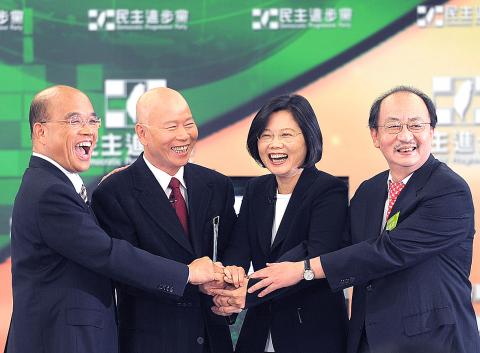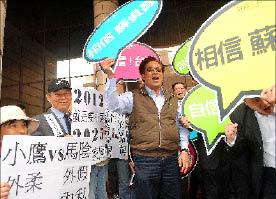The three Democratic Progressive Party (DPP) presidential hopefuls refined their campaign platforms yesterday in a vibrant and passionate appeal for support amid close poll numbers and with only days left before the primaries end.
In the first of four televised policy platform addresses, the candidates differed over how they would tackle problems they said the country faced, including a growing income gap, the social welfare situation and the economy.
However, they all focused on how their potential administrations would tackle cross-strait issues and the relationship with Beijing.

Photo: Fang Pin-chao, Taipei Times
The discussions highlighted some of the main challenges the party expects to face as it heads into the presidential election.
Frontrunners Tsai Ing-wen (蔡英文), who took a leave of absence as party chairperson to run for president, and former premier Su Tseng-chang (蘇貞昌) refrained from making any new policy announcements, but listed a long line of issues they said needed to be tackled, while defending their records in government.
Tsai said future DPP cross-strait policy would be more “steady and moderate” than that of former president Chen Shui-bian (陳水扁), while Su said the DPP had learned from its mistakes and reflected on its performance since it lost the presidency in 2008.

Photo: Chien Jung-fong, Taipei Times
“I believe that the DPP’s abilities to handle cross-strait relations exceed the current administration’s. We can responsibly and viably handle the ties [with China], which will be normalized and stabilized,” Tsai said. “I have confidence that I can be a firm and steady leader.”
However, she was also careful to say that many of the policies she had laid out had been ongoing since before 2008, when she led the Mainland Affairs Council and was vice premier, citing the DPP’s “three small links” policy and cross-strait charter flights as examples.
“These policies would have continued if the DPP had continued governing past 2008,” she said.
Su tackled the touchy issue of Taiwan’s sovereignty, suggesting that he favored a stronger separation between Taiwan and China.
He said that Taiwan was already “undisputedly” a sovereign democracy called the Republic of China.
“And any changes to this require a wide consensus from all of society,” Su said. “I believe that the most important thing is that Taiwan is united [internally] and that we can present a common front abroad.”
The most emotional performance came from Hsu Hsin-liang (許信良) when he said that Taiwan should “open up wide to Chinese money, students and tourists” — true to his election announcement that he did not expect to win, but hoped to influence election policy.
“The single most important issue is Taiwan’s economic growth,” Hsu said.
“I care about cross-strait ties because I care about their economic impact. Only with growth can we craft and fund better social welfare policies,” Hsu said.
His participation in the discussion was a wildcard for Tsai and Su, who offered more restrained remarks closely modeled on what they have been saying for the past few weeks. Both candidates made references to Hsu’s remarks, but not to each other’s.
The televised appearance -offered the three an equal platform and a chance for the public to see them directly compare their ideas for the first time. It was broadcast live on FTV News and moderated by FTV host Hu Wan-ling (胡婉玲).
Revealing moments included forgetting to call on Hsu to answer a moderated question and Hsu passionately recalling his past experience as a democracy activist to lend credibility to his remarks. Hsu has been trailing heavily in polls behind Tsai and Su, both of whom he has said would make a “more viable” candidate to represent the DPP.
Tsai and Su struggled when pressed to name more “substantive measures” they would implement to grow Taiwan’s economy. The two called GDP numbers “a flawed indicator of growth.” Taiwan’s economy is expected to grow 6.14 percent this year.
Tsai said a future administration needed more measures to support small to medium-sized enterprises and that economic policy must create better-paying jobs. Farming, she said, needed to become an engine of growth.
In return, Su said that Taiwan’s industry “is vibrant,” but needs more government support, while suggesting that current cross-strait policy has given too much power over Taiwan’s economic policy to Beijing.
“Successful economic policy is seen through the happiness of the Taiwanese people,” he said.
Hsu, meanwhile, called on greater deregulation of Taiwan’s economy, especially to China.
“President Ma [Ying-jeou (馬英九)] was too timid. If he wasn’t so timid, we wouldn’t even be in this race today,” he said. “If he let in 20 million Chinese tourists, we would have all applauded him.”
The two-hour discussion fielded three questions each from academics and former policymakers: former Mainland Affairs Council chairperson Joseph Wu (吳釗燮), Taiwan Thinktank chair Chen Po-chih (陳博志) and Ku Chung-hwa (顧忠華), a sociology professor at National Chengchi University.
Candidates were not given the opportunity to ask each other questions, a policy that will hold for the three discussions the DPP will hold later this month, on April 13, 16 and 20, which will be broadcast on cable news stations ETTV, Era News and SET TV respectively.
An issue of interest during the session were Tsai and Su’s remarks on the qualities they believed Taiwan’s next leader needed, using the televised opportunity to give themselves a leg up on tightly contested polls by endorsing themselves.
“We have to compare who is best suited to lead the country during an era of rapid global change,” said Tsai, 54, the youngest of the three. “Taiwan needs a next generation leader. The future president must be willing to tackle the difficulties we face.”
However, Su, who was Tsai’s superior as premier between 2006 and 2007, said: “The difficulties Taiwan faces are only becoming greater and the responsibilities facing the future leader of this country are only going to become larger.”
“We need a leader that can take control of our direction,” he said.
Through the proceedings, Su also spoke on his ideas on national restructuring, calling the current division of special municipalities, cities and counties “unequal.” Tsai also unveiled the three main points she called essential to Taiwan’s future: safeguarding sovereignty, economic renewal and a more -harmonious society.
DPP officials called the discussion, which remained cordial and on schedule, “a success.”
“We hope this atmosphere can continue in the three more coming sessions,” DPP spokesperson Cheng Wen-tsang (鄭文燦) said.

SEPARATE: The MAC rebutted Beijing’s claim that Taiwan is China’s province, asserting that UN Resolution 2758 neither mentions Taiwan nor grants the PRC authority over it The “status quo” of democratic Taiwan and autocratic China not belonging to each other has long been recognized by the international community, the Mainland Affairs Council (MAC) said yesterday in its rebuttal of Beijing’s claim that Taiwan can only be represented in the UN as “Taiwan, Province of China.” Chinese Minister of Foreign Affairs Wang Yi (王毅) yesterday at a news conference of the third session at the 14th National People’s Congress said that Taiwan can only be referred to as “Taiwan, Province of China” at the UN. Taiwan is an inseparable part of Chinese territory, which is not only history but

CROSSED A LINE: While entertainers working in China have made pro-China statements before, this time it seriously affected the nation’s security and interests, a source said The Mainland Affairs Council (MAC) late on Saturday night condemned the comments of Taiwanese entertainers who reposted Chinese statements denigrating Taiwan’s sovereignty. The nation’s cross-strait affairs authority issued the statement after several Taiwanese entertainers, including Patty Hou (侯佩岑), Ouyang Nana (歐陽娜娜) and Michelle Chen (陳妍希), on Friday and Saturday shared on their respective Sina Weibo (微博) accounts a post by state broadcaster China Central Television. The post showed an image of a map of Taiwan along with the five stars of the Chinese flag, and the message: “Taiwan is never a country. It never was and never will be.” The post followed remarks

INVESTMENT WATCH: The US activity would not affect the firm’s investment in Taiwan, where 11 production lines would likely be completed this year, C.C. Wei said Investments by Taiwan Semiconductor Manufacturing Co (TSMC, 台積電) in the US should not be a cause for concern, but rather seen as the moment that the company and Taiwan stepped into the global spotlight, President William Lai (賴清德) told a news conference at the Presidential Office in Taipei yesterday alongside TSMC chairman and chief executive officer C.C. Wei (魏哲家). Wei and US President Donald Trump in Washington on Monday announced plans to invest US$100 billion in the US to build three advanced foundries, two packaging plants, and a research and development center, after Trump threatened to slap tariffs on chips made

Proposed amendments would forbid the use of all personal electronic devices during school hours in high schools and below, starting from the next school year in August, the Ministry of Education said on Monday. The Regulations on the Use of Mobile Devices at Educational Facilities up to High Schools (高級中等以下學校校園行動載具使用原則) state that mobile devices — defined as mobile phones, laptops, tablets, smartwatches or other wearables — should be turned off at school. The changes would stipulate that use of such devices during class is forbidden, and the devices should be handed to a teacher or the school for safekeeping. The amendments also say